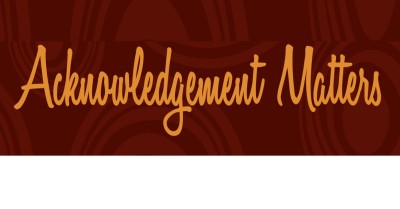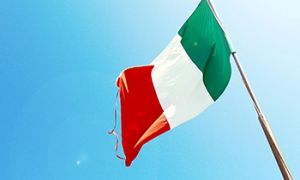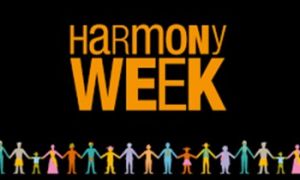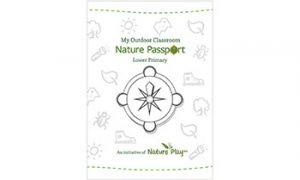Two protocols related to Country are important to know about in order to show respect for aboriginal people and their custodianship of and close ongoing connection to the land.
WELCOME TO COUNTRY
A Welcome to Country is a ritual or formal ceremony performed at many events held in Australia, intended to highlight the cultural significance of the surrounding area to a particular Aboriginal clan or language group who are recognised as Traditional Owners of the land. The Welcome must be performed by a recognised elder of the group. Welcomes to Country are sometimes accompanied by traditional smoking ceremonies, music or dance. Where an elder is not available to perform the Welcome, or there is not a recognised Traditional Owner, an Acknowledgement of Country may be offered instead.
ACKNOWLEDGEMENT OF COUNTRY
If a local Elder is not available, or if the Traditional Owners have not been formally recognised for the area, an Acknowledgement of Country, also known as Acknowledgement of Traditional Owners, performed by the host of the event, is appropriate. If there is no formal recognition of Traditional Ownership, it is advised to limit recognition to an Acknowledgement of Traditional Owners generally, without making a reference to the name of any specific Traditional Owners.
An 'Acknowledgement of Country' is a way that all people can show awareness and respect for Aboriginal culture and heritage and the ongoing relationship the traditional owners have with their land.
Both Aboriginal and non-Aboriginal people can perform 'Acknowledgement of Country'. It is a demonstration of respect dedicated to the traditional custodians of the land (or sea) where the event, meeting, school function or conference takes place. It can be formal or informal.
General: I begin by acknowledging the Traditional Owners of the land on which we meet today, and pay my respects to Elders past and present.
Specific: I begin by acknowledging the Traditional Owners of the land on which we meet today, the [Traditional Owners] of the [nation], and pay my respects to Elders past and present.
Note: If possible, and if you are unsure of phrasing or specific details, it is recommended that you contact your local Traditional Owners for information
Acknowledgement of Country and Welcome to Country: Confidence With the Basics Webinar
Feel nervous, unsure or just a bit awkward giving an Acknowledgement of Country? Don't really understand the difference between an Acknowledgement and a Welcome? Been asked to organise a Welcome to Country and don't know where to start? This webinar is hosted by Aboriginal and non-Aboriginal members of the RAP team who help with these questions and more.
Click the link to watch the free webinar: Acknowledgement of Country and Welcome to Country Webinar
Aboriginal and Torres Strait Islander peoples have experienced a long history of exclusion from Australian history books, the Australian flag, the Australian anthem, and for many years, Australian democracy. This history of dispossession and colonisation lies at the heart of the disparity between Aboriginal and Torres Strait Islander and non-Indigenous Australians today. Including recognition of Aboriginal and Torres Strait Islander people in events, meetings, and national symbols, is one part of ending the exclusion that has been so damaging.
Incorporating welcoming and acknowledgement protocols into official meetings and events recognises Aboriginal and Torres Strait Islander peoples as the First Australians, and the Traditional Custodians of the land. It promotes an ongoing connection to the place of Aboriginal and Torres Strait Islander Australians and shows respect for Traditional Owners.
References:
Reconciliation Australia
Welcome to Country & Acknowledgement of Country, Creative Spirits
Welcome To Country, Wikipedia



 As an Educator in Australia, your pay rate falls under the Children’s Services Award 2010. This award states the minimum amount that an employer can
As an Educator in Australia, your pay rate falls under the Children’s Services Award 2010. This award states the minimum amount that an employer can When working as a qualified Early Childhood Teacher (with a university degree) within a service, your rate of pay will come from the Educational Services
When working as a qualified Early Childhood Teacher (with a university degree) within a service, your rate of pay will come from the Educational Services When working as a Diploma Qualified Educator your pay rate is from the Children's Services Award 2010. This Award states your minimum rate of pay
When working as a Diploma Qualified Educator your pay rate is from the Children's Services Award 2010. This Award states your minimum rate of pay When working as a Cert 3 Qualified Educator, your pay rate is from the Children's Services Award 2010. This Award states your minimum rate of
When working as a Cert 3 Qualified Educator, your pay rate is from the Children's Services Award 2010. This Award states your minimum rate of Educational Leaders play a crucial role in their early childhood service by ensuring that the educational program aligns with best practices and supports the holistic
Educational Leaders play a crucial role in their early childhood service by ensuring that the educational program aligns with best practices and supports the holistic In early childhood education and care, ratios are more than a technicality—they are a frontline safeguard. Every child deserves responsive supervision, emotional connection, and developmental
In early childhood education and care, ratios are more than a technicality—they are a frontline safeguard. Every child deserves responsive supervision, emotional connection, and developmental Here’s a comprehensive Mobile Phone and Smart Watch Policy tailored for early childhood education and care (ECEC) services in Australia, aligned with the latest 2025
Here’s a comprehensive Mobile Phone and Smart Watch Policy tailored for early childhood education and care (ECEC) services in Australia, aligned with the latest 2025 With the new national child safety reforms kicking in on 1 September 2025, early childhood services like yours have a real opportunity to lead the
With the new national child safety reforms kicking in on 1 September 2025, early childhood services like yours have a real opportunity to lead the The Sea of Fish Challenge is a national initiative that invites children, educators, families, and communities to create and display fish artworks as a symbol
The Sea of Fish Challenge is a national initiative that invites children, educators, families, and communities to create and display fish artworks as a symbol Across the early childhood education and care sector, educators are sounding the alarm: current staffing ratios are insufficient to deliver safe, meaningful, and developmentally appropriate
Across the early childhood education and care sector, educators are sounding the alarm: current staffing ratios are insufficient to deliver safe, meaningful, and developmentally appropriate


